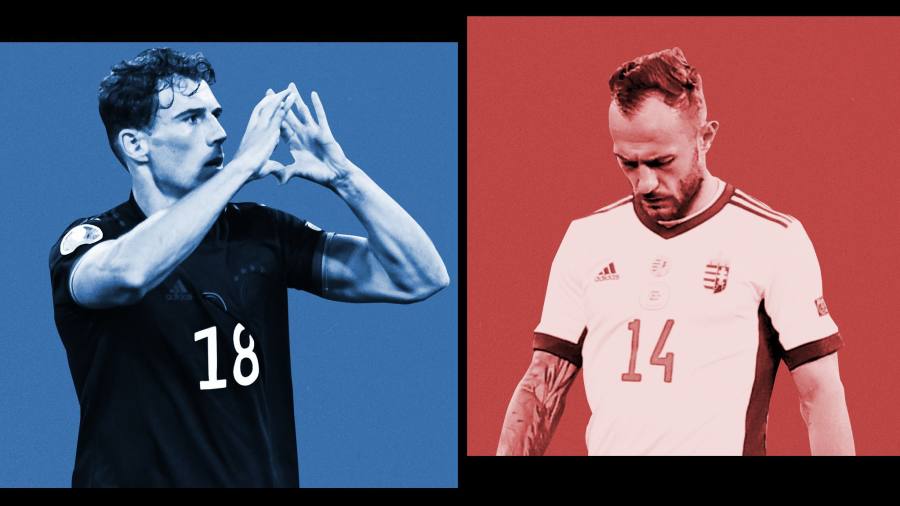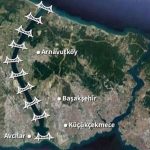Watching Euro 2020, you see the phantom Iron Curtain that still runs across the continent. Europe’s east-west divide persists in football, and the west’s system works better.
In the group stages, western European teams won 15 and drew three of their 21 matches against opponents from the former communist bloc plus Turkey.
All 10 countries with more than 1m inhabitants in the western European landmass stretching from Portugal to Denmark made the second round, as did their closest western neighbours, England, Wales and Sweden. From the ex-communist east, only Croatia, the Czech Republic and Ukraine have made it.
It is tempting to dismiss western Europe’s footballing lead as simply the result of greater wealth. In fact, it has more to do with superior knowhow and social democracy.
It cannot be a straightforward story of wealth, because eastern Europe did better at football during the communist era, when it lagged even further behind economically. Hungary and Czechoslovakia reached World Cup finals in 1954 and 1962 respectively, Poland finished third at the World Cups of 1974 and 1982, the Soviets were European champions in 1960 and the Czechs in 1976.
Talent production stalled when communism collapsed. State-run sports facilities fell into disuse amid an economic crisis. Many big eastern European clubs were bought by oligarchs more interested in buying star players than maintaining youth academies.
Today, northwestern Europeans play significantly more sport than easterners, according to a 2018 European Commission study. Belgium, the Netherlands, Sweden and Denmark have all made the Euro 2020 knockout rounds, in part surely because these small countries have relatively large pools of active footballers. Of the Netherlands’ 17m inhabitants, 1.2m play for a football club.
A striking image of Euro 2020 has been mixed western teams defeating all-white eastern opponents. Large immigrant populations seem to be a boon to national teams. Paul Pogba, the French midfielder, explained that in the mixed suburbs of Paris where he and several teammates grew up: “Everyone will play football. That’s all there is.”
Poor children flee their cramped homes to play outside in state-provided facilities. Underneath Pogba’s childhood apartment block in Roissy-en-Brie, east of Paris, is a small sports court with basketball hoops and football goals. At state-funded clubs in these neighbourhoods, the kids encounter qualified coaches who teach them tactics.
The best then learn cutting-edge football in western Europe’s leading leagues. Zvonimir Boban, the new head of football at Uefa, European football’s governing body, said his 1990s generation of great Croatian players benefited from leaving a collapsing Yugoslavia for the west in their early twenties.
“We had these brilliant experiences in the top European leagues. We knew then how to implement it in our national team,” he said.
That is why, perversely, the eastern European countries with the richest leagues fare worse: their best players do not develop because they stay at home, getting well paid to play slow, backward football. That is how Russia and Ukraine could lose four group matches to small western countries.
There is more hope for central Europeans such as the Czech Republic and Croatia, World Cup finalists in 2018, whose players leave early for western football. And as central Europe gets richer, it should resume funding mass sport.
That is already happening in Poland, which ran a sports field-building project named “Orlik”, or young eagle, after the country’s national symbol. The government justified the effort with classic social-democratic language: “One of the state’s key tasks is to ensure that citizens can practise sports, regardless of their financial and social status.”
More than 2,600 artificial pitches were built nationwide, each supervised by a qualified coach. Orlik alumni should strengthen future Polish teams, but at Euro 2020, Poland did not win a match.
Football’s east-west divide encompasses values, too. Several western sides are “taking the knee” in solidarity with the Black Lives Matter movement — a gesture disparaged by Viktor Orban, Hungary’s prime minister, and the head of Poland’s football association, Zbigniew Boniek.
Now western teams are protesting against Hungary’s new anti-LGBT+ law. Leon Goretzka, Germany’s outspoken midfielder, made the anti-homophobic “One Love” sign after scoring the goal that knocked Hungary out of the tournament on Wednesday. Manuel Neuer, his team captain, wore a rainbow armband, just as Neuer’s Dutch counterpart Georginio Wijnaldum will wear a One Love armband in Sunday’s game against the Czechs in Budapest.
“We support everyone, and everyone belongs,” explained Wijnaldum. “We know the situation in Hungary. It’s a shame that only people who have a podium are listened to. Why not listen to the people who really matter, in this case gay people?”
He was understating the importance of football. With Uefa now investigating Hungarian fans for allegedly chanting homophobic and racist abuse at their matches, Euro 2020 has become a podium where the two Europes enact their conflicts.
By: Simon Kuper
Source: FT



